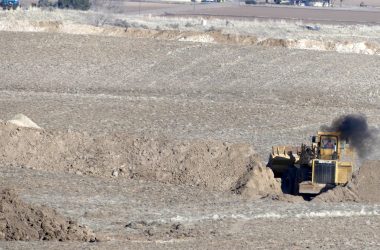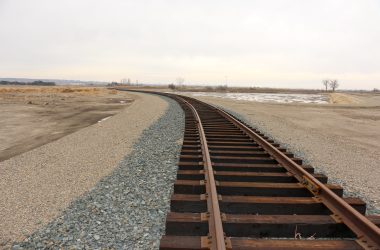NYSSA – Those in charge of the Treasure Valley Reload Center are hoping their months-long chase to get an extra $3 million in state funding is over.
They anticipate that legislators this week will approve emergency funding, allowing for construction to begin soon on the warehouse frame at the Nyssa site.
Yet the Legislative Fiscal Office, which analyzes state spending, has recommended legislators put off until next year a decision on the $3 million request. They indicate there is no emergency requiring immediate action by the legislative Emergency Board.
“The Legislative Fiscal Office recommends that the Emergency Board defer consideration of the request until the 2023 regular legislative session,” according to a report released last week.
Legislators could override that recommendation when they convene in Salem this Wednesday, Sept. 21.
Doing so would ignore analysts’ caution that Malheur County Development Corp., the public company set up to build the rail center, would still be far short of having money to finish the project even with the extra $3 million. And putting up the warehouse building soon would make no difference for this year’s onion crop, which will go to market in traditional ways, analysts say.
READ IT: Legislative report
The report from the Legislative Fiscal Office also noted that granting such emergency funding to Malheur County Development would be unusual. The Emergency Board is a group of legislators who deal with state budget emergencies when the Legislature isn’t in session. It usually doesn’t consider the type of request coming from Malheur County.
Brad Baird is president of Anderson Perry & Associates, the engineering firm overseeing the project. On Sept. 8, he addressed questions from state officials as they considered the emergency funding request. He didn’t respond to more recent questions from the Enterprise
He said that besides the $3 million in emergency funding, Malheur County Development would need to find another $6 million soon to stay on track to finish the rail center by spring.
Analysts noted doubted that prospect.
“Without funding sources identified to support remaining project elements, it is unclear whether the facility will be operational by the target completion date,” according to the legislative analysis.
If legislators put off the pending request, that would be the third time that the $3 million has eluded those behind the Treasure Valley Reload Center. Officials have never explained how they picked that number.
Greg Smith, project leader and a state representative from Heppner, in March announced that legislators had allocated $3 million for the project.
They hadn’t.

In May, state Sen. Lynn Findley, the Vale Republican who sits on the development company board, joined with state Rep. Mark Owens, R-Crane to ask the Emergency Board for the $3 million.
They were denied.
Project leaders seemed confident that a third time would be the winner. Findley holds a seat on the Emergency Board – and so does Smith.
That political muscle may yet reveal itself this week if the Emergency Board acts against the advice of its budget advisers and gives Malheur County the $3 million.
Without that money, Treasure Valley Reload Center appears headed for mothballs as project leaders exhaust the $26 million already provided by the state.
This matters because the economic gains promised for Malheur County five years ago would be postponed again while public expenses for the project continue to mount. The reload center was intended to make local agriculture more competitive in the national produce market.
But if the center isn’t operating, onion producers are stuck with their customary and sometimes unreliable methods of getting 50-pound bags to market – by truck and some by train. But it also means that other segments of Treasure Valley’s agricultural industry will have to wait even longer to get use of the publicly-funded reload center.
And more important to Malheur County, a stalled Treasure Valley Reload Center could mean even longer delays in developing the adjacent Arcadia Industrial Park. That property, now just cropland and weeds north of Nyssa, is owned by Malheur County and once was pitched as a source for 300 local jobs.
Project missteps and miscalculations have stalled construction and Baird and his team have blamed inflation and “unforeseen” ground conditions.
With current funding, contractors have filled and graded acres of farmland, a task that took four times more rock than engineers calculated. There is money for the current work of laying down rails for spur lines off the Union Pacific Railroad. And project leaders already bought the steel exterior for the warehouse building.
Officials now are turning to the state for a taxpayer rescue to keep the project going.
Grant Kitamura is president of the development company and a partner in Ontario’s Baker & Murakami Produce Co. In an interview last week, he said the $3 million “can be” enough to get Treasure Valley Reload Center running.
But recent budget estimates indicate that’s not so.
The estimate shows Malheur County Development Corp. doesn’t have money to put in utilities. There could mean no power or water and no roads for trucks to reach the warehouse.
And there is no money to buy a train engine, needed to arrange loaded rail cars into a string for Union Pacific Railroad to pick up.
According to Baird, the $3 million would pay only for the warehouse foundation and erecting the steel shell.
State analysts asked what was the emergency and pressed for details on what funding was yet needed and where Malheur County Development Corp. intended to get it.

The emergency
In justifying the rush, Baird said project leaders want to pour concrete before winter sets in.
He said if the emergency money wasn’t awarded, “then the concrete work would have to occur in the winter during cold weather, which is not preferrable and will cost more due to needing to protect the concrete from freezing.”
Baird didn’t explain where the money would come from for that winter work if the $3 million wasn’t provided.
Later in his response, he said that without the extra funding, “We would likely wait until next spring” to do the work.
When officials asked what would happen to the current onion harvest without the building, Baird responded that “this year’s onion crop can be harvested, stored and shipped in the same manner as it has for many years.”
Kitamura he said onion industry at this point wouldn’t now need rail shipping out of Nyssa until a year from now.
Projections show the heaviest demand for reload center shipping is from October to April.
Baird said project managers plan to have finish the reload center by next April – if they can obtain more money.
The money needed
An analyst said project leaders provided “bits and pieces” of financial information and asked: “What is the TOTAL PICTURE in terms of project budget and financing.”
The analyst noted that a project budget prepared in July didn’t reveal the cost for essential features that weren’t funded.
“We hadn’t completed a budget estimate in early July,” Baird responded.
His team subsequently produced a more detailed budget – after an editorial in the Malheur Enterprise noted the lack of cost information or any calculation of the total extra money needed.
Baird told state officials that Malheur County Development needed not only the $3 million in emergency funding but another $6 million “to wrap up the project.”
The funding
The analyst asked what Malheur County Development had done to obtain other funding to finish the project.
Baird listed for state officials four sources that Malheur County Development considered for the $6 million more needed. Two have already been scratched.
He said a special funding program from the Oregon Department of Transportation was considered to cover road costs – but the project doesn’t qualify.
He said borrowing money from Business Oregon for utilities was considered, but Malheur County Development doesn’t qualify and would require the city of Nyssa to act as borrower.
“The city wasn’t interested,” Baird told state officials.
Jim Maret, Nyssa city manager, said he couldn’t recall being asked about such a loan but said he wouldn’t have put the city in that position anyhow.
Baird also said the developers would again seek money from Americold, the multinational company that would run the Treasure Valley Reload Center. Baird and board members of the development company have complained in recent months that Americold has identified costly ventilation equipment and special doors for the Nyssa building that isn’t necessary to ship onions.
Project leaders earlier this year asked the company for $2.5 million. The company rejected the request, and Baird didn’t explain to state officials why chances were better now that Americold would write such a check.
Baird also said the development company might take out a loan “to help with the remaining funding gap.”
Smith has previously suggested mortgaging the reload center.
Baird and Smith haven’t disclosed how much would be borrowed – or how such a loan would get paid back.
For now, the development company would have one source of income -– the monthly lease payment of $2,500 from Americold. That would not be enough to repay millions in borrowing.
Kitamura in an interview said the development company might have to impose an extra charge on users of the reload center to come up with the money.
Contact Editor Les Zaitz: [email protected]
PREVIOUS COVERAGE:
Your guide to the Treasure Valley Reload Center – get the history, purpose and status
Former Washington state legislator, ex-Vale resident pushes for an investigation of Greg Smith
Costs still mounting, as rail center tab finally calculated – $9 million more needed
Governor pushes extra $3 million for Nyssa rail center to cover cost overruns
County judge says $26 million should be enough for Nyssa rail center
Malheur County blocks Enterprise from news conference on rail center
Engineering costs for Nyssa project jump with belated contract change
Nyssa rail center stopped in its tracks – no money for building
EXCELLENCE IN JOURNALISM – Available for $7.50 a month. Subscribe to the digital service of the Enterprise and get the very best in local journalism. We report with care, attention to accuracy, and an unwavering devotion to fairness. Get the kind of news you’ve been looking for – day in and day out from the Enterprise.




